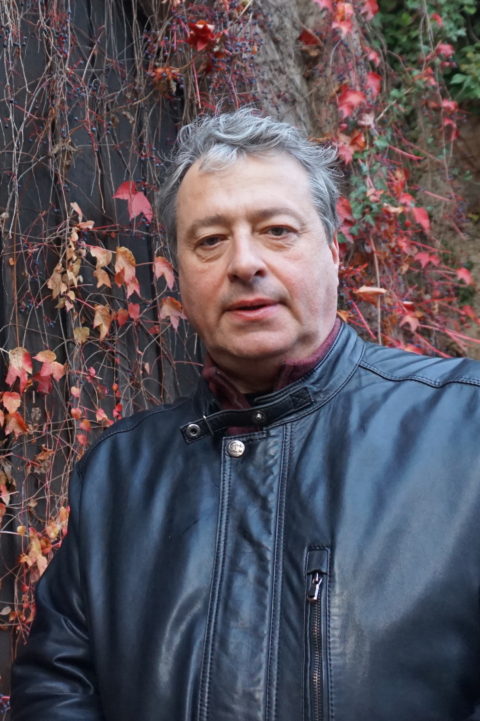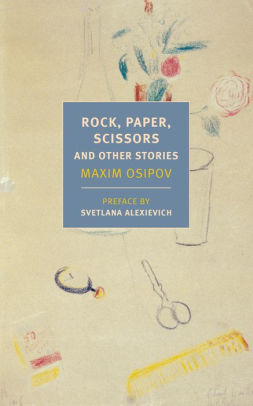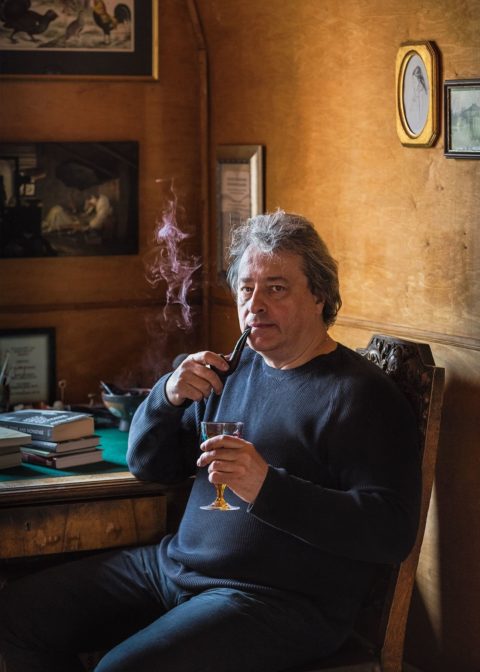Born in Moscow in 1963, Maxim Osipov has published six collections of short stories in Russian as well as essays and plays. Selections of his work have been published in French, German, Hebrew and seven other European languages. Rock, Paper, Scissors and Other Stories represents his work’s first appearance in English. Osipov practices medicine as a cardiologist in Tarusa, a town located about 90 miles outside Moscow, and has written an authoritative textbook on echocardiography. He oversees a charitable foundation to support the local hospital, and, for 17 years, ran a publishing house for medical literature. Lev Dodin, perhaps the most famous of contemporary Russian theatre producers, has staged an adaptation of one of his stories in St. Petersburg in his Maly Theatre. Since Osipov is both a doctor and a writer, many reviewers have compared him to Chekhov who, however, did not often address medical subject matter in his stories. It is possible that a more apt comparison would be with the early, realistic stories by Mikhail Bulgakov, published in English as A Country Doctor’s Notebook.
 The first of these stories I encountered, four or five years ago, was “Moscow-Petrozavodsk.” I was reading slowly, in Russian, together with Anne Marie Jackson, who was then my mentee and who went on to translate the story. What I recall most clearly is how often the story wrong-footed me. Like the story’s narrator, a doctor traveling by night train from Moscow to the Northern city of Petrozavodsk, I kept jumping to judgments that were soon proved simple-minded. In the morning, towards the end of the journey, one of the two men with whom the doctor has shared a compartment is shaking violently. The doctor thinks he is suffering from alcohol withdrawal — from delirium tremens. Afraid the man will smash up the compartment, the doctor calls the conductress. She phones the police – and at the next station the two men are viciously beaten up by policemen. Appalled, the doctor feels he is to blame. For a moment, I was ready to classify the story as “gritty realism.” I had, it seemed to me, read this kind of thing before.
The first of these stories I encountered, four or five years ago, was “Moscow-Petrozavodsk.” I was reading slowly, in Russian, together with Anne Marie Jackson, who was then my mentee and who went on to translate the story. What I recall most clearly is how often the story wrong-footed me. Like the story’s narrator, a doctor traveling by night train from Moscow to the Northern city of Petrozavodsk, I kept jumping to judgments that were soon proved simple-minded. In the morning, towards the end of the journey, one of the two men with whom the doctor has shared a compartment is shaking violently. The doctor thinks he is suffering from alcohol withdrawal — from delirium tremens. Afraid the man will smash up the compartment, the doctor calls the conductress. She phones the police – and at the next station the two men are viciously beaten up by policemen. Appalled, the doctor feels he is to blame. For a moment, I was ready to classify the story as “gritty realism.” I had, it seemed to me, read this kind of thing before.
But in the world of Osipov’s stories, it is not only acts of brutality that are unpredictable. Compassion and understanding are also to be found in unexpected places. Wanting to complain about this incident of mindless brutality, the doctor phones various police and interior ministry offices. To his surprise, he is admitted to see a police colonel who explains that the two men were wanted murderers, and that the police knew they were on the train. Nevertheless, the police might have failed to find them; the doctor’s intervention had been helpful and there is no need for him to blame himself.
Clinging to his notions of legality, the doctor talks about correct procedures. “‘In America,’ he says, ‘somehow they get by without clubbing everyone.’” The mention of America prompts the colonel to tell a story about his father’s experience of the war. Taken prisoner in 1941, he had, despite being a Jew, survived the war in a German labor camp. In 1945, the camp was liberated by the Americans. “It happened like this: they surrounded the camp and waited for the guards to surrender and get butchered by the prisoners. They could wait all day, even two days. They kept their distance. It was a typical American practice. The Germans wanted to be taken prisoner, but what did the Americans want with German prisoners?” The colonel’s father then initiated the gang-rape and eventual murder of the good-looking but sadistic wife of the camp commandant. “‘Throughout the entire war,’ says the colonel, ‘my father didn’t kill one person. And if the Americans had liberated them the way they should have – humanely – then he wouldn’t still be thinking about that German dame.’” The doctor, naturally, doesn’t know what to say. Reality, Osipov repeatedly shows us, is more complicated than the stories we tell ourselves about it.
 In an interview with Osipov recently published by the Los Angeles Review of Books, he says, “I’m not the first to observe that music is the greatest teacher of composition in any art, including writing. There are many similarities between short stories and musical sonatas. Both last between 15 and 40 minutes. They ‘make nothing happen,’ as Auden said of poetry. When we listen to a sonata for the first time the purpose is to decide whether we want to listen to it again or not. The same should occur when you read a short story. Like a sonata, a work of short fiction should strive to compress many elements, and be built of significant changes in rhythm, tonality, etc. These are the aspects that make a superlative story stand out – not its subject matter.” Osipov’s subject matter is both interesting and pertinent. As a doctor who has worked for many years in a provincial hospital, he expresses a profound understanding of contemporary Russian life, including its seamiest aspects – and he imparts this knowledge without the least hint of didacticism. What makes him a great writer, though, is the subtlety with which he allows the different voices in his stories to respond to one another, sometimes amplifying, sometimes contradicting one another – as in a string quartet, which Osipov says is his favorite form of all. A motif of “Moscow-Petrozavodsk,” repeated in different contexts, is the phrase “Killers – they’re just your average people.” When we first hear this phrase, we may not quite accept it. But by the end of the story, we do. Each repetition endows it with more resonance.
In an interview with Osipov recently published by the Los Angeles Review of Books, he says, “I’m not the first to observe that music is the greatest teacher of composition in any art, including writing. There are many similarities between short stories and musical sonatas. Both last between 15 and 40 minutes. They ‘make nothing happen,’ as Auden said of poetry. When we listen to a sonata for the first time the purpose is to decide whether we want to listen to it again or not. The same should occur when you read a short story. Like a sonata, a work of short fiction should strive to compress many elements, and be built of significant changes in rhythm, tonality, etc. These are the aspects that make a superlative story stand out – not its subject matter.” Osipov’s subject matter is both interesting and pertinent. As a doctor who has worked for many years in a provincial hospital, he expresses a profound understanding of contemporary Russian life, including its seamiest aspects – and he imparts this knowledge without the least hint of didacticism. What makes him a great writer, though, is the subtlety with which he allows the different voices in his stories to respond to one another, sometimes amplifying, sometimes contradicting one another – as in a string quartet, which Osipov says is his favorite form of all. A motif of “Moscow-Petrozavodsk,” repeated in different contexts, is the phrase “Killers – they’re just your average people.” When we first hear this phrase, we may not quite accept it. But by the end of the story, we do. Each repetition endows it with more resonance.
Varying in subject matter, the stories are set in various places – Moscow, Berlin, central Russian provincial towns, and an Arctic mining settlement called “Eternity.” “The Gypsy” is about a doctor accompanying a sick old woman traveling to Portland, Oregon for medical treatment. “Renaissance Man” is told partly from the point of view of a wealthy businessman’s security guard; for all the success of his dealings, the businessman finds it as hard as anyone else to navigate the moral, cultural and emotional confusions of Russia today. The story ends with him barely unable to anticipate the repercussions of his own actions.
The most striking tale of all, for me, is the title story, “Rock, Paper, Scissors.” Once again, we hear several different voices. The first is a well-meaning retired teacher of Russian literature; the second is that of Ksenia – a successful female restaurant proprietor who unfairly blames the teacher for her daughter’s suicide and is plotting to burn down his house so she can build a new church there; the third voice is Ksenia’s most trusted employee, a beautiful, determined, highly intelligent but taciturn Tajik called Roxana. We learn about Roxana’s background only in the story’s last pages when she is imprisoned, waiting to be tried for stabbing to death the town political boss who has attempted to rape her.
 Ksenia visits Roxana in her cell and, for the first time, hears her story. The young woman, too, turns out to be a former literature teacher who had once written a dissertation on the work of Andrey Platonov. When a long civil war destroyed both her family and Tajikistan, she eventually turned to Islam, embracing it with impassioned conviction. Ksenia’s own beliefs are deeply confused and Roxana mocks them with fierce clarity: “But what does Ksenia believe in? Saint Nicholas the Wonderworker? The Tsar Redeemer? International Women’s Day? Or everything – all at once?” Almost inadvertently, she convinces Ksenia of the truth of Islam – and Ksenia resolves to build not a church, but a mosque. Osipov gives the last word to the retired literature teacher with whom the story began: “I believe that a well-placed comma will open many doors for my kids: don’t ask me how, exactly – I couldn’t say. But from these details – comma placement, geometry, continents and channels, the dates of Suvorov’s campaigns, love for Chopin and Blok – sprouts an active, harmonious life.”
Ksenia visits Roxana in her cell and, for the first time, hears her story. The young woman, too, turns out to be a former literature teacher who had once written a dissertation on the work of Andrey Platonov. When a long civil war destroyed both her family and Tajikistan, she eventually turned to Islam, embracing it with impassioned conviction. Ksenia’s own beliefs are deeply confused and Roxana mocks them with fierce clarity: “But what does Ksenia believe in? Saint Nicholas the Wonderworker? The Tsar Redeemer? International Women’s Day? Or everything – all at once?” Almost inadvertently, she convinces Ksenia of the truth of Islam – and Ksenia resolves to build not a church, but a mosque. Osipov gives the last word to the retired literature teacher with whom the story began: “I believe that a well-placed comma will open many doors for my kids: don’t ask me how, exactly – I couldn’t say. But from these details – comma placement, geometry, continents and channels, the dates of Suvorov’s campaigns, love for Chopin and Blok – sprouts an active, harmonious life.”
The story is remarkable for the vividness with which Osipov conveys each of its different voices. It has also helped me to understand how and why, in a world wrecked by wars and the breakdown of belief systems, even highly educated, sophisticated people can turn to fundamentalism of one kind or another.
The twelve stories here – Osipov’s own choice of work from his six Russian collections – are translated with exemplary fluency by Boris Dralyuk, Alex Fleming and Anne-Marie Jackson. There are countless complex details of everyday life in the Soviet – and post-Soviet — world that the translators succeed in making understandable to anglophones. All too many translations of Russian literature are marred by confusion over such details. Osipov himself, who lived for several years in the US (he was a research fellow at the University of California), was closely involved in the production of this NYRB volume. In the interview mentioned earlier, he says, “Once a story is finished, I assemble extensive footnotes for its future. There can be up to 200 for a 10-page story. They include the sources of quotations, explanations of rarely used words, and some realities that a foreigner may not be aware of. My footnotes should not under any circumstance be considered part of the text proper; their purpose is to be helpful. As a reader, you don’t have to understand every word in a work – that’s not the reason we are drawn to certain texts or films or music. But for translators, this comprehension is essential, and I would like to help facilitate it.”
[Published April 9, 2019 by New York Review Books Classics, 312 pages, $17.95 paperback]
One comment on “on Rock, Paper, Scissors and Other Stories by Maxim Osipov, translated from the Russian by Boris Dralyuk, Alex Fleming and Anne Marie Jackson”